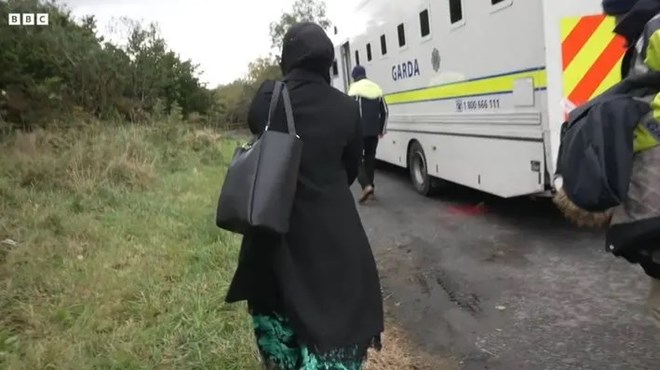
Tuesday November 26, 2024

A Somali woman walks near a Garda immigration vehicle during a border inspection in Ireland, as authorities intensify efforts to curb illegal migration through Northern Ireland.
Mogadishu (HOL) — Ireland is stepping up immigration enforcement, significantly impacting Somali asylum seekers navigating its evolving migration policies.
In recent months, Ireland’s police force, Gardaí, has intensified border inspections along its 500-kilometer (310-mile) frontier with Northern Ireland. Officers have been conducting spot checks on buses, targeting undocumented migrants crossing the open border.
“If they don’t have valid documentation to remain in Ireland, we escort them to Dublin,” explained Chief Superintendent Aidan Minnock, head of the Garda National Immigration Bureau. “From there, we place them on a boat and send them back to the UK the same day.”
The crackdown coincides with a nearly 300% increase in asylum applications this year compared to five years ago. Analysts attribute the surge to the UK’s stricter immigration policies following Brexit, fears of deportation to Rwanda, and Ireland’s robust post-pandemic economic recovery.
Ireland’s land border with Northern Ireland remains a major entry point for migrants from the UK, as no passport checks are conducted at ports or airports between the two nations. While Gardaí have intensified patrols, officials acknowledge that the true number of undocumented crossings is likely much higher than reported.
This year, over 2,000 individuals who entered Ireland illegally received deportation orders, a 156% increase from 2023. Yet only 129 deportations have been confirmed, highlighting enforcement challenges. The government plans to introduce chartered flights for deportations and streamline immigration processes by reallocating some duties from Gardaí to other agencies.
Ireland’s severe housing crisis further complicates the situation for asylum seekers. The country ranks last in the European Union for housing accessibility for young people, and the strain is evident.
The number of people housed by International Protection Accommodation Services (IPAS) has quadrupled in under three years, growing from 7,244 to 32,649. Additionally, more than 100,000 Ukrainians have sought refuge in Ireland since 2022, placing unprecedented pressure on housing resources.
Temporary accommodations for asylum seekers now include hotels, converted schools, apartment complexes, and tent camps. Approximately 1,000 people are currently housed in emergency shelters, unable to transition into permanent housing due to ongoing shortages.
The crackdown has sparked concerns among Somali advocates and human rights organizations. Suleiman Mohamed Abdullahi, director of the Horn of Africa Peoples Aid in Northern Ireland, criticized the tightening policies, describing them as “reactive” rather than addressing root causes.
“The Irish government is revising its immigration laws, and we expect the Minister of Justice to propose new measures soon,” Abdullahi said. “This likely includes bolstering border security and returning migrants fleeing UK policies, such as deportations to Rwanda.”
While Abdullahi acknowledged Ireland’s right to enforce its borders, he emphasized that restrictive measures rarely deter individuals fleeing hardship. “People seeking safety and stability will always find ways to move,” he added.
As a member of the European Union, Ireland’s migration policies must align with EU standards, offering asylum seekers additional legal avenues. Those denied protection in Ireland can appeal to EU courts, potentially gaining a reprieve.
- With files from the BBC Somali Service